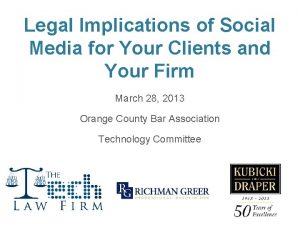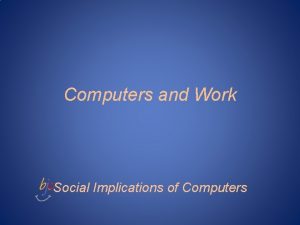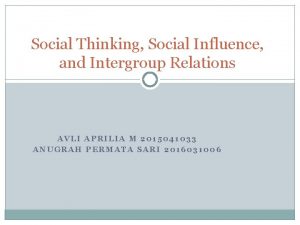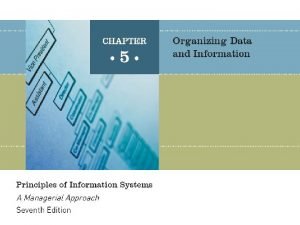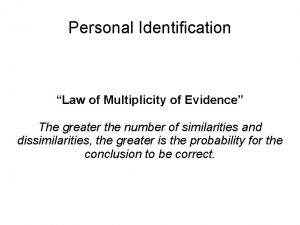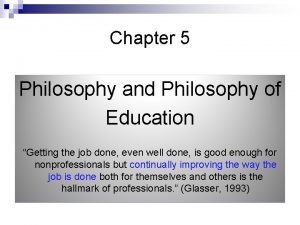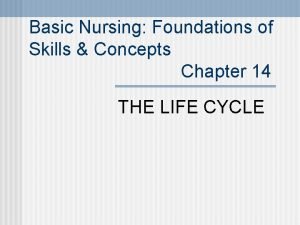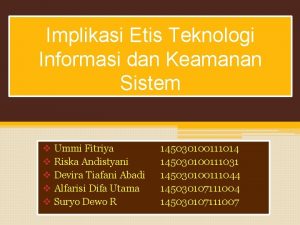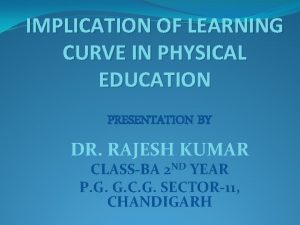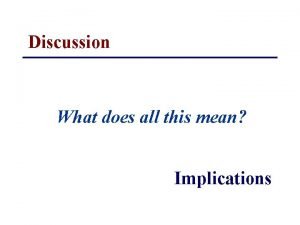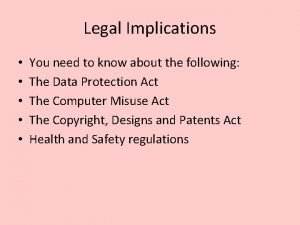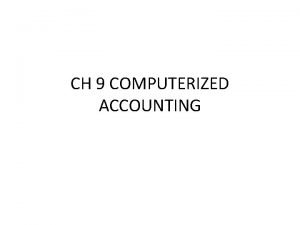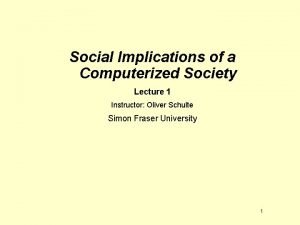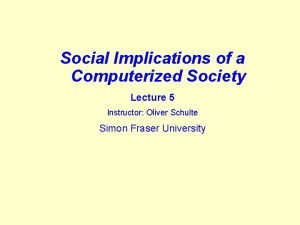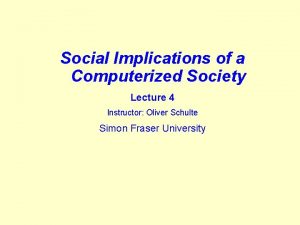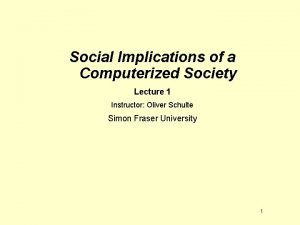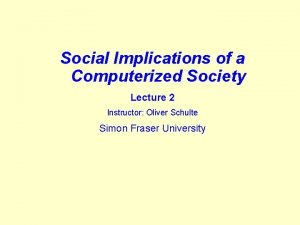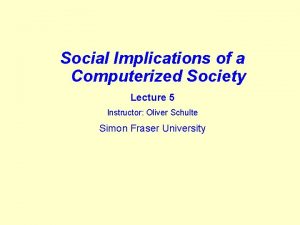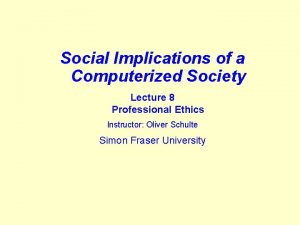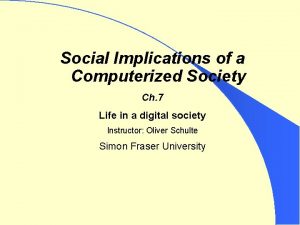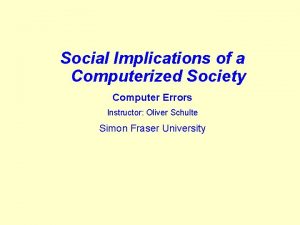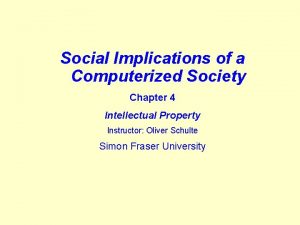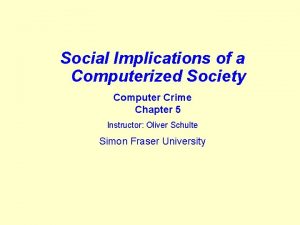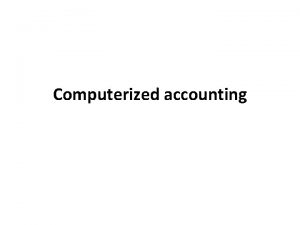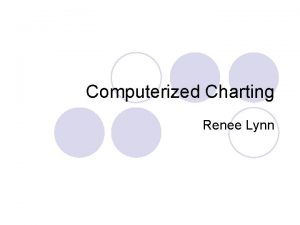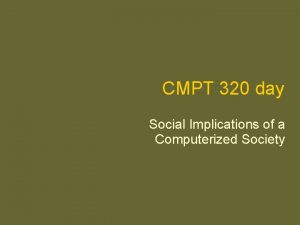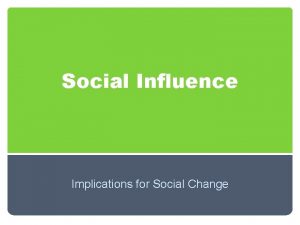Social Implications of a Computerized Society Lecture 3


































- Slides: 34

Social Implications of a Computerized Society Lecture 3 Instructor: Oliver Schulte Simon Fraser University

Outline • • Freedom of Speech: traditional views and issues. New internet-related issues: – enforcing existing restrictions on free speech. – legal status of internet companies: publisher or common carrier? – treatment of spam Anonymity: to what extent should internet users be anonymous? Access: who, if anyone, controls access to the net? And how?

Key Concepts • • Common Carrier Principles for liability of technology providers, government interference with rights such as free speech. Net neutrality (skip) Networking effects

Freedom of Speech Canadian Charter: Everyone has the following fundamental freedoms: …b) freedom of thought, belief, opinion and expression, including freedom of the press and other media of communication. • Similar rights in all Western democracies. •

Freedom of Speech as a Right • • One of the main negative liberties (freedom to act). Promotes and protects other liberties (freedom to criticize the government, demand one’s other rights).

Freedom of Speech: Utilitarian Perspective • J. S. Mill, “On Liberty”: Freedom of Speech promotes social welfare because it allows us to propose good policies and oppose bad ones.

Freedom Speech: Universalist/Golden Rule • • “Freedom is always the freedom of those who disagree”. Rosa Luxemburg. “I disagree with what you say, but I will defend to the death your right to say it”. Voltaire.

Free-speech Principles – Advocating illegal acts is legal – Does not protect libel and direct, specific threats – Inciting violence is illegal – Allows some restrictions on advertising – Protect anonymous speech

Traditional Controversies about Free Speech • • • Some speech is prohibited. – discussion of bombs at airport – laws against defamation – Nazi Slogans, Auschwitz denial in France. – in Canada, advocating genocide or inciting hatred against any 'identifiable group' is an indictable offense. Hard cases, e. g. obscenity vs. erotica. Or spam. Anonymous speech is often viewed as bad manners, cowardly, anti-social---but it is protected by law.

New issues about free speech arising from the internet Outline • Enforcement of existing restrictions on free speech. • Attempts to extend restrictions for internet. International issues. • Legal status of internet companies (ISPs, Google, E-bay, AOL): broadcaster or common carrier?

Enforcement of existing restrictions: Legal Approaches • • Generally difficult to enforce restrictions on individuals: – anonymity on the internet (supported by remailers, anonymizing software). – easy to open websites, e-mail accounts. – privacy protection limits gvt access to records of on-line activity. Gvts go after businesses that provide internet communication.

Censorship and Companies • • • Californian BBS operators were prosecuted in Tennessee for pornographic content posted on their bulletin board. Yahoo and its CEO were sued by French government for Nazi memorabilia sold on their auction site. Google eventually complied with Chinese censorship laws about criticizing the gvt, reporting on natural disasters, and talking about censorship.

Company Liability for Content • • An important general principle (North America): If a technology has substantive legal uses, the technology provider is not liable for illegal uses. (“guns don’t kill people…”). (We come back to this with copyright violations. ) Internet companies like Yahoo are viewed as technology providers, not publishers/broadcasters, so they are not generally liable for illegal content. (More later)

International Dimension • • What if Yahoo is liable for certain content under French law or Chinese law? Do we end up with the lowest common denominator? Possible technological solution: geotargeting (as with on-line music, dvds).

Discussion Question • • Should companies like Google aid countries like China in enforcing their national censorship laws? Should companies like Google support the same rights foreigners as for North Americans?

Restricting the Web: Technological Approaches • • China has 1000 s of censors monitoring chat rooms. Filters block access to pornographic sites.

Issues with Filters • • • Hard to eliminate both false positives and false negatives, despite machine learning. – False positives: Beaver College, Yale U biology department website. – False negatives (about 91%): files within documents. Private use is fine, but gvt mandate is restrictive considering the false positives (e. g. , in libraries). Important general principles: – Adults should not be restricted to only what is suitable for children. – The government should use the least intrusive means to enforce the law (e. g. , filters rather than shut down ISPs).

Discussion Question • Child/parent advocates argue that the internet poses a new kind of danger to children poses it brings pornographic content directly into the home. Do you agree that there is a new threat? Do you think the new threat requires new solutions? What solutions would you favour (e. g. , technical, economic, legal)?

The Conceptual Challenge • • • Traditional Distinction: – publisher/broadcaster (e. g. , Mac. Lean’s, CBC). – common carrier (e. g. , Telus). Publishers: – liable for content – right to freedom of expression – right not to publish common carrier: – not liable for content – must give universal access

Discussion Question • Are internet companies like Google, AOL, E-Bay publishers or common carriers? Do they fit these categories?

A New Kind of Animal • • Internet communication companies are not common carriers. – can block access, e. g. spammers. – Ebay: no Ku Klux clan memorabilia Internet companies are not broadcasters: not liable for content.

Are internet companies simply technology providers? • • Companies keep interacting with users, not just sell technology once. They often control most of the communication in their niche, e. g. a website blocked from Google will be missed by many people.

Networking Effects and the First. Mover Advantage • • From an economic point of view, many computer industry markets show strong networking effects. I. e. , the more users you have, you more attractive you are to other users, so you get more users etc. E. g. , the more people sell on E-bay, the more people buy on E-bay, the more people sell. Networking effects lead to a strong firstmover advantage: if you’re the first to get set up, you get many users and it’s difficult to compete (e. g. , You. Tube, Facebook).

Coordination Games Left Right Left 1, 1: each 0, 0: nobody player gets 1 gets anything Right 0, 0: nobody 1, 1: each gets anything player gets 1

Coordination Games (2): A Simple Model of Networking Effects Sell on E-bay Sell on Amazon Buy on Ebay 1, 1: each 0, 0: nobody player gets 1 gets anything Buy on Amazon 0, 0: nobody 1, 1: each gets anything player gets 1

A New Problem: SPAM • • Defn: unsolicited bulk e-mail. Mostly commercial advertising. Possible because e-mail is so cheap! (a kind of fishing expedition) Estimated at 30 billion/day worldwide. AOL: fought for right to block Spam, sue spammers.

Discussion Question • • Do you think spam should be blocked? By whom: the gvt, ISPs, or individual users? How should spam be stopped?

Should Spam be blocked? – + + Difficult to define SPAM, e. g. – survey company e-mailed users who had signed up with them. – mailing lists. Utilitarian Argument: costs on users, mail systems outweigh benefit to spammer. Free speech is not an issue, especially with advertising.

Economic/Technical Solutions to Spam • • – • • Sender pays small charge to recipient, could depend on recipient (ie, charge only if unwanted mail). Needs micropayment system. may deter poor people, nonprofits from using e-mail. Goodmail company: certifies e-mail as nonspam for small charge per mail. AOL, Yahoo, Time have signed up. z Filters: imperfect, false positives bad.

Legal Approach to Spam Can-Spam bill from U. S. congress • opt-out provisions • can’t disguise sender • reaches only legitimate businesses

Anonymity on the web • • • Most web postings are anonymous (user name only). Important for privacy (gay chat room, reviews, opinions). Also used by government agencies (CIA) for anonymous surveillance. Supported by re-mailers, anonymizing software.

Concerns with Anonymity • • • It hides crime or protects criminals Glowing reviews (such as those posted on e. Bay or Amazon. com) may actually be from the author, publisher, seller, or their friends. Similarly, bad reviews may be from competitors, stock market manipulators. U. S. and European countries working on laws that require ISPs to maintain records of the true identity of each user and maintain records of online activity for potential use in criminal investigations

Discussion Question: Government against Anonymity • • As with anti-encryption legislation, U. S. and European countries working on laws that require ISPs to maintain records of the true identity of each user and maintain records of online activity for potential use in criminal investigations Do you agree with this policy? In addition to your own opinion, look at it from utilitarian, rights-based and universalist perspective.

Net Neutrality • • + - Cable and phone companies must treat all content and customers the same way. Can telecoms charge different prices for different internet users? Compare with express lanes on freeways. encourages investment in broadband. crowd out small users. how competitive is the telecomm market? market entry barriers.
 Legal implications of social media
Legal implications of social media Social implications of computers
Social implications of computers 01:640:244 lecture notes - lecture 15: plat, idah, farad
01:640:244 lecture notes - lecture 15: plat, idah, farad Gertler econ
Gertler econ Social thinking adalah
Social thinking adalah Social thinking social influence social relations
Social thinking social influence social relations Database management approach
Database management approach Educational implications of constructivism
Educational implications of constructivism Implication table
Implication table Nursing implications for synthroid
Nursing implications for synthroid Law of multiplicity of evidence meaning
Law of multiplicity of evidence meaning Eng2d media unit
Eng2d media unit Marketing implications
Marketing implications Tautological implication
Tautological implication Implications math
Implications math Progressivism educational philosophy
Progressivism educational philosophy Marketing implications
Marketing implications Nursing implications
Nursing implications Social learning theory bandura 1971
Social learning theory bandura 1971 Implications of nativist theory
Implications of nativist theory Implications of nativist theory
Implications of nativist theory Implikasi etis adalah
Implikasi etis adalah Educational implications of learning curve
Educational implications of learning curve Implications of quantum entanglement
Implications of quantum entanglement Chapter 23 legal implications in nursing practice
Chapter 23 legal implications in nursing practice Ranexa nursing implications
Ranexa nursing implications Humalog nursing implications
Humalog nursing implications Introduction of learning
Introduction of learning Discussion and implications
Discussion and implications Implications of vygotsky's sociocultural theory
Implications of vygotsky's sociocultural theory Medical implications of developmental biology
Medical implications of developmental biology What is legal implications
What is legal implications Nietzsche on existentialism
Nietzsche on existentialism Legal implications in nursing practice
Legal implications in nursing practice Ionotroph
Ionotroph
